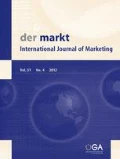Dear Madam or Sir,
This issue marks the last in my tenure as editor-in-chief of der markt—International Journal of Marketing. Over the last four years, I have had the good fortune to work closely with highly reputable authors and colleagues, who have contributed their expertise towards improving the quality and scope of this journal. In 2009, the strategic re-positioning of der markt coincided with the introduction of a rigorous double-blind review process and the extension of the editorial review board. Since then, the journal has developed even better than imagined and is currently in great shape. der markt continues to attract an increasing number of manuscripts on diverse and novel topics, using varied empirical methods. Consequently, special thanks go to the members of the editorial review board and the numerous ad hoc reviewers of this journal. As of March of this year, der markt—International Journal of Marketing will pass into the excellent hands of Arne Floh, who takes over as the new editor-in-chief. Arne Floh is an acknowledged expert, with broad editorial experience and substantial dedication to der markt. He will further strengthen the international position and reputation of the journal.
Drawing on its long-established focus, der markt—International Journal of Marketing is not restricted to the established techniques, theories and approaches of research in marketing. der markt particularly encourages alternative, unconventional and innovative thinking, and approaches that broaden the scope of mainstream research. Against this backdrop, the first issue of 2012 comprises one theoretical/conceptual and three empirical manuscripts:
The issue begins with a piece of research by Rudolf R. Sinkovics (Manchester Business School) and Anthony S. Roath (University of Bath). The authors concentrate on the influence of firms’ learning orientations and strategic flexibility, on performance. The study focuses on exporting manufacturers and their contractual relationships with international distributors. In contrast to existing studies, the authors find evidence in favor of an indirect influence of learning orientation on firm performance, using structural equation modeling. Following that, the authors provide theoretical and managerial implications. Based on a comprehensive literature review, the second article, by Michael Reiss and Armin Günther (The University of Stuttgart), provides an integrative and novel approach to network marketing. By analyzing three overlapping generations of network marketing and related concepts, the authors also offer a strong foundation for further considerations on this topic. The third article, by Katja Soyez (TU Dresden), June N. P. Francis (Simon Fraser University) and Maria M. Smirnova (St. Petersburg State University), analyzes the relevance of product and situational determinants of organic food-buying behavior, in a cross-national comparison. Specifically, 967 consumers from three industrialized and two transition societies are interviewed. A conceptual model is developed and empirically tested using structural equation modeling. Finally, the fourth article of this issue, by Manfred Bruhn, Matthias Mayer-Vorfelder and Alexander Maier (University of Basel), studies the international literature on services marketing. The authors examine both the theoretical background and existing research. Moreover, the geographic development of research in this field of marketing is outlined. To do so, the authors examine 1,840 papers, from 34 marketing journals, published between 2000 and 2009.
It is worth mentioning that the Österreichische Gesellschaft für Absatzwirtschaft (ÖGA), publisher of der markt—International Journal of Marketing, is supported by some leading organizations. Without their support, the purposes and activities of the ÖGA could not be pursued. I am particularly grateful to the following companies and organizations: Casinos Austria AG, Feibra Werbung GmbH, Henkel Austria GmbH, Kelly GmbH, A1 Telekom Austria AG, Finanzmarketing-Verband Österreich, Wiener Städtische Versicherung AG, SPAR Österreich Warenhandels AG, and Vöslauer Minerlwasser AG.
Author information
Authors and Affiliations
Corresponding author
Rights and permissions
About this article
Cite this article
Zauner, A. Editorial. markt 51, 1–2 (2012). https://doi.org/10.1007/s12642-012-0077-z
Published:
Issue Date:
DOI: https://doi.org/10.1007/s12642-012-0077-z

